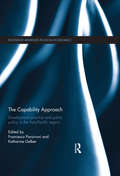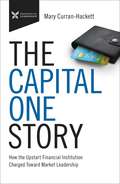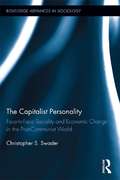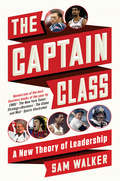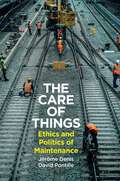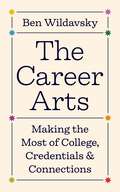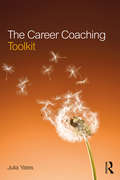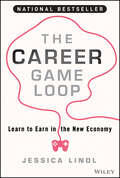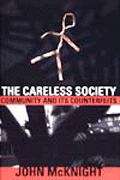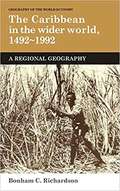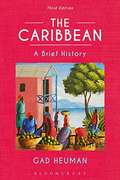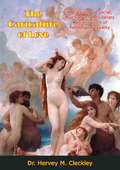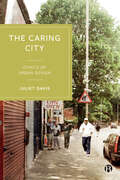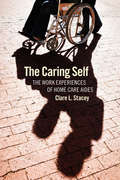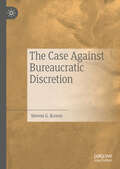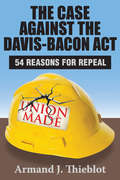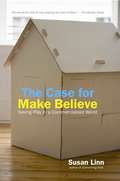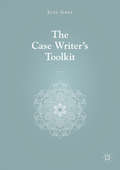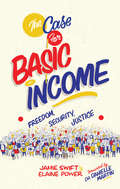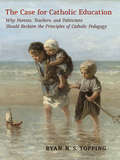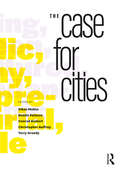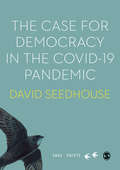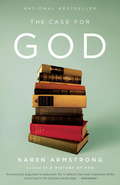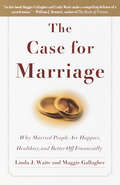- Table View
- List View
The Capability Approach: Development Practice and Public Policy in the Asia-Pacific Region (Routledge Advances in Social Economics #18)
by Francesca Panzironi Katharine GelberThis book provides a unique laboratory of ‘capabilities in practice’ in the Asia-Pacific region. It explores the application of the capability approach in development practice and public policy from a multidisciplinary perspective by bringing together scholars and practitioners from a wide range of disciplinary backgrounds, including development studies, health policy, political science, political theory, political economy, architecture, indigenous studies, urban planning and communication technologies. The first part of the book provides a foundational theoretical framework to introduce the empirical applications of the capability theory in different areas of development practice and public policy in the Asia-Pacific region. This part discusses thorny issues in capability theory and raises the potential for capability theory to lead to new ways of thinking about old problems. The second part discusses the application of the capability approach to intransigent problems of marginalisation and the articulation of public policy in New Zealand and Australia. In particular, this part focuses on the potential implications that a capability-based approach can have on the well-being of indigenous peoples in both countries, as well as children, older renters, and urban dwellers in Australia. The third part elucidates how capability theory is being applied by researchers in the Asia-Pacific region to local issues in developing countries such as Samoa, Vanuatu, Papua New Guinea and Sri Lanka. In doing so, it provides original content to the world market in capability theory by focussing on this often-neglected area of scholarship. As a whole, this volume offers a unique and innovative scrutiny of a multifaceted capability-based analysis of development practice and public policy. The scope and breadth of this volume advance the application of the capability approach and offer an indispensable resource to scholars, researchers, policy makers and policy practitioners interested in the theoretical insights and practical implications of the capability approach.
The Capital One Story: How the Upstart Financial Institution Charged Toward Market Leadership (The Business Storybook Series)
by Mary Curran HackettWhat can you learn from the most successful companies in the world? The Capital One Story will help you understand and adopt the competitive strategies, workplace culture, and daily business practices that enabled an unlikely credit card startup to revolutionize the credit industry.After twenty-five years in the credit card business, Capital One has earned its place in wallets across the world. When the company&’s two young founders set out to individualize credit, the financial world thought they were crazy…until it was clear that they weren&’t.Working in the banking industry, Richard Fairbank and Nigel Morris saw that the one-size-fits all standard that the credit card companies employed was leaving big money on the table. They cracked the code and figured out how to customize the credit card experience by offering personalized designs, credit limits, and rewards, revolutionizing the way the credit card industry operated.Known for their ubiquitous advertising campaigns with A-list talent such as Jennifer Garner and Samuel L. Jackson, the youngest bank in the business was once turned down by every one of their competitors but has since grown to dominate the industry.Through the story of Capital One, you&’ll learn:How to recognize underserved sections of a market.How rejection by every company in the business doesn&’t mean it&’s time to quit.How to determine what people want and how to get it to them.How to employ marketing campaigns that will change the way people live.Discover how this iconic organization got it right and created a successful long-lasting business, and how you can do the same for your company.
The Capitalist Personality: Face-to-Face Sociality and Economic Change in the Post-Communist World (Routledge Advances in Sociology #86)
by Christopher S. SwaderModern capitalism favors values that undermine our face-to-face bonds with friends and family members. Focusing on the post-communist world, and comparing it to more "developed" societies, this book reveals the mixed effects of capitalist culture on interpersonal relationships. While most observers blame the egoism and asocial behavior found in new free-market societies on their communist pasts, this work shows how relationships are also threatened by the profit orientations and personal ambition unleashed by economic development. Successful people in societies as diverse as China, Russia, and Eastern Germany adjust to the market economy at a social cost, relaxing their morals in order to obtain success and succumbing to increased material temptations to exploit relationships for their own financial and professional gain. The capitalist personality is internally troubled as a result of this "sellout," but these qualms subside as it devalues intimate qualitative bonds with others. This book also shows that post-communists are similarly individualized as people living in Western societies. Capitalism may indeed favor values of independence, creativity, and self-expressiveness, but it also rewards self-centeredness, consumerism, and the stripping down of morality. As is the case in the West, capitalist culture fosters an internally conflicted and self-centered personality in post-communist societies.
The Captain Class: A New Theory of Leadership
by Sam WalkerThe founding editor of The Wall Street Journal’s sports section profiles the greatest teams in history and identifies the counterintuitive leadership qualities of the unconventional men and women who drove them to succeed.The secret to winning is not what you think it is. It’s not the coach. It’s not the star. It’s not money. It’s not a strategy. It’s something else entirely. Several years ago, Sam Walker set out to answer one of the most hotly debated questions in sports: What are the greatest teams of all time? He devised a formula, then applied it to thousands of teams from leagues all over the world, from the NBA to the English Premier League to Olympic field hockey. When he was done, he had a list of the sixteen most dominant teams in history. At that point, he became obsessed with another, more complicated question: What did these freak teams have in common? As Walker dug into their stories, a pattern emerged: Each team had the same type of captain—a singular leader with an unconventional skill set who drove it to achieve sustained, historic greatness. Fueled by a lifetime of sports spectating, twenty years of reporting, and a decade of painstaking research, The Captain Class tells the surprising story of what makes teams exceptional. Drawing on original interviews with athletes from two dozen countries, as well as general managers, coaches, executives, and others skilled at building teams, Walker identifies the seven core qualities of this Captain Class—from extreme doggedness and emotional control to a knack for nonverbal communication to tactical aggression and the courage to stand apart. Told through riveting accounts of some of the most pressure-soaked moments in sports history—from Bill Russell’s legendary “Coleman Play” in the 1957 NBA Finals to Barcelona’s “Figo Game” against Real Madrid in 2000—The Captain Class doesn’t just bring these events to life; it presents a fresh, counterintuitive take on leadership that can be applied to a wide spectrum of competitive disciplines. The men and women who make up the Captain Class were never the most skilled athletes, nor were they gifted orators or paragons of sportsmanship. They were often role players who were allergic to the spotlight. In short, the seven attributes they shared challenge your assumptions of what inspired leadership looks like.Advance praise for The Captain Class“Well-researched, wildly entertaining, and thought-provoking. In The Captain Class, Sam Walker presents compelling narratives about the secret ingredient to the greatest teams of all time—and quickly makes you reexamine long-held beliefs about leadership and the glue that binds winning teams together.”—Theo Epstein, President of Baseball Operations for the Chicago Cubs“In The Captain Class, Sam Walker gives us important and original insights into the mysterious ingredients of transformative leadership. A stunning mix of research and narrative.”—Susan Cain, bestselling author of Quiet “If you care about leadership, talent development, or the art of competition, you need to read this immediately.”—Daniel Coyle, bestselling author of The Talent Code“The Captain Class is a brilliant hybrid: one-part detective story and one-part leadership book, set in the world of sports, and dedicated to a fascinating mystery: What sets apart the greatest teams of all time? I’m not even a sports nut and I couldn't put it down.”—Dan Heath, co-author of the New York Times bestseller Made to Stick
The Care of Things: Ethics and Politics of Maintenance
by Jerome Denis David PontilleWhat does a coffee machine, a car, road signs, a smartphone, a cathedral, a work of art, a satellite, a bicycle, a washing machine, a bridge, a watch, a computer, the body of a prominent politician and a tractor have in common? Pretty much nothing – except for the fact that, no matter how small, large, important or insignificant something is, it rarely survives without being cared for. Every object eventually experiences wear and tear, it deteriorates, stops working or breaks down. But are we giving the care of things the recognition it deserves? A counterpoint to our modern obsession with innovation but less striking than the one-off act of restoration, the delicate act of making things last rarely attracts our attention.This book disrupts our dominant narratives by putting those individuals skilled in the art of maintenance front and centre. Jérôme Denis and David Pontille shine a spotlight on the subtle aspects of caring for things, tracing the stories of those involved and, with them, the ethical challenges raised and political lessons learned. These people demonstrate a sensitivity and attentiveness to fragility; they encourage us to cultivate a material diplomacy in which wear is accepted and our relation to things becomes a matter of negotiation and compromise – a far cry from the frenetic rhythm of planned obsolescence inherent in hyper-consumerism. Maintenance demarcates the contours of a world in which we have relinquished the human longing for unlimited power and technological autonomy, a world where our attachment to things is more profound than we ever imagined.
The Career Arts: Making the Most of College, Credentials, and Connections
by Ben WildavskyA persuasive case for building career success through broad education, targeted skills, and social capitalYoung people coming out of high school today can expect to hold many jobs over the course of their lives, which is why they need a range of essential skills. The Career Arts provides a corrective to the widespread and misleading notion that there is a direct trade-off between going to college and acquiring practical job skills. Ben Wildavsky cuts through the noise and anxiety surrounding this issue to offer sensible, clear-eyed guidance for anyone who is making decisions about education and career preparation with a view to getting ahead in the workforce.Drawing on evidence-based research, illuminating case studies, and in-depth interviews, Wildavsky shares the most vital lessons of what he calls the career arts, which include cultivating a mix of broad and targeted skills, taking advantage of employer-funded education benefits, and preparing for the world as it is, not as you wish it could be. He explains why college remains the gold standard of credentials, and presents the most promising high-quality supplements and alternatives to college that can help learners combine general and job-specific skills. He shows how building social capital is also critical to success, particularly for disadvantaged students.An invaluable guidebook for students, parents, counselors, and educators, The Career Arts reveals why college education and job preparation are not either-or propositions and identifies the blend of education and networking needed to support real-world career aspirations.
The Career Coaching Toolkit
by Julia YatesThe Career Coaching Toolkit is a practical guide to 34 effective and relevant career coaching techniques to help practitioners encourage, stretch and clarify their clients’ thinking. Structured around ten of the most common career dilemmas clients bring to their coaches, this book provides clear advice to coaches about when to apply the right technique to address all of these problems. With a dual focus on theory and practice, each chapter explores the links between the coaching technique and the scientific research on which it is based. The book explains how and why the technique works, giving the reader a real appreciation of the underlying mechanisms that make these techniques effective. Written specifically for career coaching, this deepened understanding will enhance confidence when working with clients. A practical toolkit for practitioners and students alike, The Career Coaching Toolkit will add depth to the practice of anyone working with clients facing a career crossroads, or conducting research into occupational identities and career decision making.
The Career Game Loop: Learn to Earn in the New Economy
by Jessica LindlDesign a more fulfilling, resilient career for the new world of work In The Career Game Loop: Learn to Earn in the New Economy, veteran gaming, education, and social impact executive, Jessica Lindl, delivers an exciting playbook for navigating today’s dynamic career landscape inspired by an unlikely source - gaming. Drawing parallels between gaming and career advancement, you’ll explore why learning, earning, and advancing are continuous, interwoven, and life-long processes, and how you can navigate a fulfilling career in the 21st century economy. Lindl dives deep into the data of modern job hunting, training, networking, recruitment, and more as she tells the stories of real people who have overcome daunting obstacles to find the career they’ve always dreamed of. She also explains the mindsets, behaviors, and practice tips drawn from gaming you can implement immediately to create resilient, future-proof careers in a world where adaptability is the ultimate power-up. You’ll also find: Discussions of the Silicon Valley talent development model that helps make careers more resilient Cost-effective alternatives to the cost-prohibitive four-year degree model Resources you can access immediately to move quickly into more fulfilling, high-paying work Perfect for new graduates and young professionals just entering the global workforce, The Career Game Loop is also a must-read for anyone considering a career change, people re-entering the labor force after an absence, HR professionals, and employers from around the world seeking new insights into how modern employees think about work.
The Careless Society: Community and Its Counterfeits
by John McknightAmid all the hand-wringing about the loss of community in America these days, here is a book that celebrates the ability of neighborhoods to heal themselves from within. John McKnight shows how competent communities have been invaded and colonized by professionalized services-often with devastating results. Overwhelmed by these social services, the spirit of community falters: families collapse, schools fail, violence spreads, and medical systems spiral out of control. Instead of more or better services, the basis for resolving many of America's social problems is the community capacity of the local citizens.
The Caribbean in the Wider World, 1492-1992: A Regional Geography (Geography of the World-Economy)
by Peter Taylor Chris Dixon John Agnew Peter Gregory Roger Lee Bonham C. RichardsonThe Caribbean was Europe's first colony, its landscapes transformed to produce tropical staples and its decimated aboriginal populace replaced with African slaves. As European power has waned in the Caribbean, it has been replaced by the geopolitical domination of the United States. Professor Richardson examines this colonization and recolonization of the Caribbean during the past half millennium, portraying a region victimized by natural hazards, soil erosion, overpopulation and gunboat diplomacy. Most importantly, he explains the ways in which Caribbean peoples have reacted and adapted to their external influences. No other single survey of the region provides equivalent breadth--ranging from aboriginal ecologies to today's narcotic traffic--or harnesses so effectively elements of the past to illuminate the present.
The Caribbean: A Brief History
by Gad HeumanIn this new edition of his crucial introduction to Caribbean history, Gad Heuman provides a comprehensive overview of the region's history, from its earliest inhabitants to contemporary political and cultural developments.
The Caricature of Love: A Discussion of Social, Psychiatric, and Literary Manifestations of Pathologic Sexuality
by Dr Hervey M. CleckleyOriginally published in 1957, this book by renowned American psychiatrist Hervey M. Cleckley focuses on two chief themes: sexual disorder and its influences, and a critical examination of some concepts of sexuality which are prominent today in psychiatry and psychology.
The Caring City: Ethics of Urban Design
by Juliet DavisIn this important contribution to urban studies, Juliet Davis makes the case for a more ethical and humane approach to city development and management. With a range of illustrative case studies, the book challenges the conventional and neoliberal thinking of urban planners and academics, and explores new ways to correct problems of inequality and exclusion. It shows how a philosophy of caring can improve both city environments and communities. This is an original and powerful theory of urban care that can promote the wellbeing of our cities’ many inhabitants.
The Caring Self: The Work Experiences of Home Care Aides (The Culture and Politics of Health Care Work)
by Clare L. StaceyAccording to the Bureau of Labor Statistics, there were approximately 1.7 million home health aides and personal and home care aides in the United States as of 2008. These home care aides are rapidly becoming the backbone of America’s system of long-term care, and their numbers continue to grow. Often referred to as frontline care providers or direct care workers, home care aides—disproportionately women of color—bathe, feed, and offer companionship to the elderly and disabled in the context of the home. In The Caring Self, Clare L. Stacey draws on observations of and interviews with aides working in Ohio and California to explore the physical and emotional labor associated with the care of others. Aides experience material hardships—most work for minimum wage, and the services they provide are denigrated as unskilled labor—and find themselves negotiating social norms and affective rules associated with both family and work. This has negative implications for workers who struggle to establish clear limits on their emotional labor in the intimate space of the home. Aides often find themselves giving more, staying longer, even paying out of pocket for patient medications or incidentals; in other words, they feel emotional obligations expected more often of family members than of employees. However, there are also positive outcomes: some aides form meaningful ties to elderly and disabled patients. This sense of connection allows them to establish a sense of dignity and social worth in a socially devalued job. The case of home care allows us to see the ways in which emotional labor can simultaneously have deleterious and empowering consequences for workers.
The Case Against Bureaucratic Discretion
by Steven G. KovenThis book explores contemporary and historical examples of bureaucratic discretion to describe a continuum of resistance to authoritative directives by hierarchical superiors. Resistance ranges from blind obedience or complete nonresistance to street-level opposition; in between these extremes, however, are minimal compliance and resistance sanctioned by immediate superiors. Although politicians may pass legislation, the subject of bureaucratic implementation or lack thereof remains an area of vital concern. Grounded in administrative theory (beginning with Woodrow Wilson’s seminal discussion of the virtue of adopting a businesslike approach to American governing) and emphasizing the power of street-level bureaucrats, the aim of this book is to expand awareness of the potentially dangerous power of insulated bureaucrats.
The Case Against the Davis-Bacon Act: Fifty-Four Reasons for Repeal
by Armand J. ThieblotThe Davis-Bacon Act is a United States federal law that established the requirement that prevailing wages must be paid on public works projects. In this book, Armand J. Thieblot argues that the law was passed under false pretenses and based on flawed economic logic. Despite this, the law continues to expand in scope and increase in cost. The act is supported by a substantial bureaucracy within the Department of Labor that has resisted all efforts at substantive modernization or reform. Today, the Davis-Bacon Act is the bedrock upon which stands one of the last bastions of private unionization in the construction industry. This book provides a compelling list of fifty-four separate reasons why the Davis-Bacon Act should be repealed.Thieblot deals with the history, purposes, and administrative concepts of prevailing wage laws, providing an overview of the act's administration. He covers the survey and determination process, and delves into how the act is administered. Thieblot summarizes its direct and indirect costs, evaluates counterclaims on the economic impact of Davis-Bacon, and considers compromises short of full repeal. Also included are seven appendices that provide full support for the conclusions summarized in the main text.Thieblot documents a case against Davis-Bacon that is neither judgmental nor political, but he does question whether there is compelling public interest in maintaining a federal prevailing wage law. He puts forward a list of reasons why the Davis-Bacon Act should be repealed, making a convincing case that deserves action and not just simple consideration. This work should be read by all economists, lawmakers, and government officials.
The Case For Make Believe
by Susan LinnIn The Case for Make Believe, Harvard child psychologist Susan Linn tells the alarming story of childhood under siege in a commercialized and technology-saturated world. Although play is essential to human development and children are born with an innate capacity for make believe, Linn argues that, in modern-day America, nurturing creative play is not only countercultural-it threatens corporate profits.A book with immediate relevance for parents and educators alike, The Case for Make Believe helps readers understand how crucial child's play is-and what parents and educators can do to protect it. At the heart of the book are stories of children at home, in school, and at a therapist's office playing about real-life issues from entering kindergarten to a sibling's death, expressing feelings they can't express directly, and making meaning of an often confusing world.In an era when toys come from television and media companies sell videos as brain-builders for babies, Linn lays out the inextricable links between play, creativity, and health, showing us how and why to preserve the space for make believe that children need to lead fulfilling and meaningful lives.
The Case Writer’s Toolkit
by June GweeThis book deconstructs the case study, describes the case writing process and explains how a good case study is composed. It is a reference book that accompanies case writers on their case writing journey. It serves as a guide for writers to develop case studies for teaching, research, and knowledge-capture. There are illustrations and charts to help writers visualise concepts, signpost ideas, break down complex information and apply techniques in a practical manner.
The Case for Basic Income: Freedom, Security, Justice
by Jamie Swift Elaine PowerInequality is up. Decent work is down. Free market fundamentalism has been exposed as a tragic failure. In a job market upended by COVID-19—with Canadians caught in the grip of precarious labour, stagnant wages, a climate crisis, and the steady creep of automation—an ever-louder chorus of voices calls for a liveable and obligation-free basic income. Could a basic income guarantee be the way forward to democratize security and intervene where the market economy and social programs fail? Jamie Swift and Elaine Power scrutinize the politics and the potential behind a radical proposal in a post-pandemic world: that wealth should be built by a society, not individuals. And that we all have an unconditional right to a fair share. In these pages, Swift and Power bring to the forefront the deeply personal stories of Canadians who participated in the 2017–2019 Ontario Basic Income Pilot; examine the essential literature and history behind the movement; and answer basic income’s critics from both the right and left.
The Case for Catholic Education: Why Parents, Teachers, and Politicians Should Reclaim the Principles of Catholic Pedagogy
by Ryan N. S. ToppingCatholic schools have long contributed to the mission of the Church and to the flourishing of society. During the past few decades, however, Catholic schools have suffered severe losses, both in their religious identity and in their capacity to attract students. With penetrating insights, pointed anecdotes, and drawing upon recent empirical studies and Church documents, Ryan Topping describes the near collapse of Catholic education in North America and uncovers the enduring principles of authentic renewal. In The Case for Catholic Education you'll discover: · the three purposes of Catholic education · why virtue is more important than self-esteem · the elements of a true "common core" curriculum · essential differences between "progressive" and "Catholic" models of learning · helpful study questions and a research guide "This is an accessible and eminently readable book on a topic which no Catholic can afford to ignore."--Joseph Pearce, Aquinas College, Nashville, TN "The Case for Catholic Education speaks to the heart of the debate over whether Catholic education is 'worth it.'"--Sister John Mary Fleming, O.P., Executive Director for Catholic Education, USCCB "The Case for Catholic Education will surely play a vital role in reinvigorating the handing-on of essential Catholic truths."--Sister Joseph Andrew Bogdanowicz, O.P., Dominican Sisters of Mary, Mother of the Eucharist, Ann Arbor, MI "This short book contains an astonishing wealth of insights and practical suggestions."--Dr. Keith Cassidy, President of Our Lady Seat of Wisdom Academy "Ryan Topping has written an engaging and coherent analysis of the state of Catholic education in North America, which will be useful for teachers in Britain, too."--Dr. Paul Shrimpton, Magdalen College School, Oxford "An insightful view of our threatened patrimony and a framed vision for what educating and forming our children may still yet become."--Dr. Jason Fugikawa, Dean of Academics and Faculty, Holy Family Academy, Manchester, NH
The Case for Cities
by Danilo Palazzo Vikas Mehta Conrad Kickert Christopher Auffrey Terry GrundyThe fateful year 2020 brought dramatic challenges to American cities. The COVID-19 pandemic and the civil unrest caused by the killing of George Floyd led to a cascade of negative media stories about cities, often politically motivated. It seemed possible that the economic and demographic gains cities had achieved over the last few decades could be lost. In fact, there has been measurable population loss in larger cities caused by changing work/life patterns and changing public perceptions about the costs and benefits of urban living. Faced with these challenges, advocates for cities must make a vigorous case for cities and show how they aren’t the cause of America’s social, environmental, economic, and public health problems but, in fact, are the places where the solutions to those problems will be found. The 38 chapters in The Case for Cities draw on the expertise of contributors from the academic, professional, and civic sectors to explore the creative tension between the two great values on which the vigor of cities depends––that they should be "Cities of Choice" (places where people who have choice want to live) and "Cities of Justice" (places that welcome and support people with limited choices). The book’s underlying perspective is that these two values are symbiotic and that promoting both is what leads to viable, sustainable urban resurgence. This book will be of keen interest to students and practitioners in urban planning, urban design, real estate, architecture, and landscape architecture and to urban advocates and civic leaders.
The Case for Democracy in the COVID-19 Pandemic (SAGE Swifts)
by David SeedhouseOne moment life was normal, the next, governments around the world were imposing radical lockdowns of their populations. But why were decision-makers so readily ignoring centuries of hard-won civil freedoms? Where was the discussion of ethics and human rights? Why were we so easily controlled and why were our controllers so willing to do it? In The Case for Democracy, David Seedhouse explores the psychological biases; distorted risk perceptions; frenetic journalism; the disputed science; the narrow focus of ′experts′; value judgements dressed up as truths; propaganda; the invisibility of ethics; and the alarming irrelevance of inclusive democracy that have been features of governmental responses to the covid-19 pandemic. Seedhouse argues that the chaotic governmental response to Coronavirus, with no attempt to include the public, is the perfect argument for an extensive, participatory democracy; a democracy that demonstrates practical decision making by listening to everyone’s knowledge and expertise. Now is the time for us to solve our problems together.
The Case for Democracy in the COVID-19 Pandemic (SAGE Swifts)
by David SeedhouseOne moment life was normal, the next, governments around the world were imposing radical lockdowns of their populations. But why were decision-makers so readily ignoring centuries of hard-won civil freedoms? Where was the discussion of ethics and human rights? Why were we so easily controlled and why were our controllers so willing to do it? In The Case for Democracy, David Seedhouse explores the psychological biases; distorted risk perceptions; frenetic journalism; the disputed science; the narrow focus of ′experts′; value judgements dressed up as truths; propaganda; the invisibility of ethics; and the alarming irrelevance of inclusive democracy that have been features of governmental responses to the covid-19 pandemic. Seedhouse argues that the chaotic governmental response to Coronavirus, with no attempt to include the public, is the perfect argument for an extensive, participatory democracy; a democracy that demonstrates practical decision making by listening to everyone’s knowledge and expertise. Now is the time for us to solve our problems together.
The Case for God: What Religion Really Means
by Karen ArmstrongThe enormous popularity of books by Richard Dawkins, Christopher Hitchens, Sam Harris and others shows that despite the religious revival that is under way in many parts of the world, there is widespread confusion about the nature of religious truth. For the first time in history, a significantly large number of people want nothing to do with God. In the past people went to great lengths to experience a sacred reality that they called God, Brahman, Nirvana or Dao; indeed religion could be said to be the distinguishing characteristic of homo sapiens. But now militant atheists preach a gospel of godlessness with the zeal of Christian missionaries in the age of faith and find an eager audience. What has happened? Karen Armstrong argues that historically atheism has rarely been a denial of the sacred itself but has nearly always rejected a particular conception of God. During the modern period, the Christians of the West developed a theology that was radically different from that of the pre-modern age. Tracing the history of faith from the Paleolithic Age to the present, Armstrong shows that until recently there was no warfare between science and religion. But science has changed the conversation. The meaning of words such as belief, faith, and mystery has been entirely altered, so that atheists and theists alike now think and speak about God - and, indeed, reason itself - in a way that our ancestors would have found astonishing. Why has the modern God become incredible? Has God a future in this age of aggressive scientific rationalism? Karen Armstrong suggests that if we draw creatively on the insights of the past, we can build a faith that speaks to the needs of our troubled and dangerously polarized world.
The Case for Marriage
by Linda J. Waite Maggie GallagherThe Case for Marriage is a critically important intervention in the national debate about the future of family. Based on the authoritative research of family sociologist Linda J. Waite, journalist Maggie Gallagher, and a number of other scholars, this book’s findings dramatically contradict the anti-marriage myths that have become the common sense of most Americans. Today a broad consensus holds that marriage is a bad deal for women, that divorce is better for children when parents are unhappy, and that marriage is essentially a private choice, not a public institution. Waite and Gallagher flatly contradict these assumptions, arguing instead that by a broad range of indices, marriage is actually better for you than being single or divorced– physically, materially, and spiritually. They contend that married people live longer, have better health, earn more money, accumulate more wealth, feel more fulfillment in their lives, enjoy more satisfying sexual relationships, and have happier and more successful children than those who remain single, cohabit, or get divorced. The Case for Marriage combines clearheaded analysis, penetrating cultural criticism, and practical advice for strengthening the institution of marriage, and provides clear, essential guidelines for reestablishing marriage as the foundation for a healthy and happy society.
